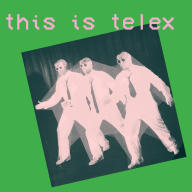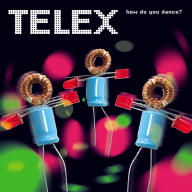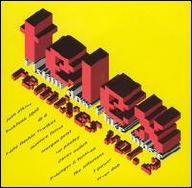Moulin, Lacksman, and Moers each had a lengthy musical pedigree by 1978, the year they formed Telex in Brussels. Moulin, primarily a composer and keyboardist, most notably guided the progressive jazz-funk band Placebo through the majority of the decade. Programming and synthesizer wiz Lacksman was behind an assortment of full-length projects under his own name and guises such as Electronic System, Electronic Butterflies, and Syne Wave. Moers, a writer, arranger, singer, and guitarist, was part of Nuit Câline à la Villa Mon Rêve and had contributed solo material to a compilation that also contained recordings by Moulin and Ariel Kalma. By the end of 1978, Telex released their first single for RKM/Vogue, a blithe cover of "Twist à Saint-Tropez," an early French rock & roll tune by Les Chats Sauvages. Looking for Saint Tropez, the parent album, followed the next year and contained another irreverent update, "Rock Around the Clock." Boosted by a licensing deal with Sire for the U.K. and U.S., the song reached number 36 in the U.K. that August. The speedy "Moskow Diskow" followed and hit the same spot on Billboard's club chart (then known as the Disco Top 100). Looking for Saint Tropez also included a calm version of Plastic Bertrand's "Ça Plane Pour Moi," another Belgian Sire licensee.
Prompted by their manager, Telex were the Belgian delegates sent to The Hague to compete in Eurovision Song Contest 1980. They aimed for last place with a performance of "Euro-Vision" and almost achieved their goal. A promotional 12" circulated to DJs by Sire in the States was backed by a jittery take on Sly the Family Stone's "Dance to the Music," and returned Telex to the club chart. Both songs appeared on the full-length Neurovision, which featured a higher percentage of fresh compositions than the debut. Among the new songs was "Tour de France," a jaunty number very different -- lyrically and musically -- from Kraftwerk's later single of the same title. For the group's third album, Sex, released in Belgium on a different label -- and with smaller licensing deals elsewhere -- they opted to use all-original material with lyrics co-written by Ron and Russell Mael of Sparks. Wonderful World and Looney Tunes, issued on different labels in 1984 and 1988, were mostly self-contained affairs; the latter yielded another Billboard club-chart entry with "Peanuts." Throughout the decade, Telex were involved with one-off 7" side projects like Darcman and the Flippers (both consisting of Moulin and Lacksman), as well as the Kiliwax's (a whole-group alias). Additionally, Michel Moers wrote and arranged pop and children's music under the name Victor Szell, and recorded a single as Z-Moor-Z.
Almost 20 years passed without a new Telex album, but in 1998 and 1999, they were behind I Don't Like Music and I (Still) Don't Like Music: Remixes, Vol. 2, projects that affirmed their dance music credentials with remixes from the likes of Carl Craig, I:Cube, Maurice Fulton, and Metro Area's Morgan Geist. In 2006, the trio ended their hiatus by offering a final studio LP, How Do You Dance?, sporting a mix of new songs and characteristically humorous interpretations of hits associated with Ritchie Valens, Canned Heat, and Sparks. Moulin, who had been active since the early '60s and had moved into production for other artists, journalism, and radio work, died of throat cancer two years later. Scattered anthologies and other catalog Telex releases continued to arrive throughout the 2010s. In 2021, Lacksman and Moers, who have remained active outside the group, teamed with Mute Records for an extensive reissue campaign beginning with This Is Telex. ~ Andy Kellman, Rovi























